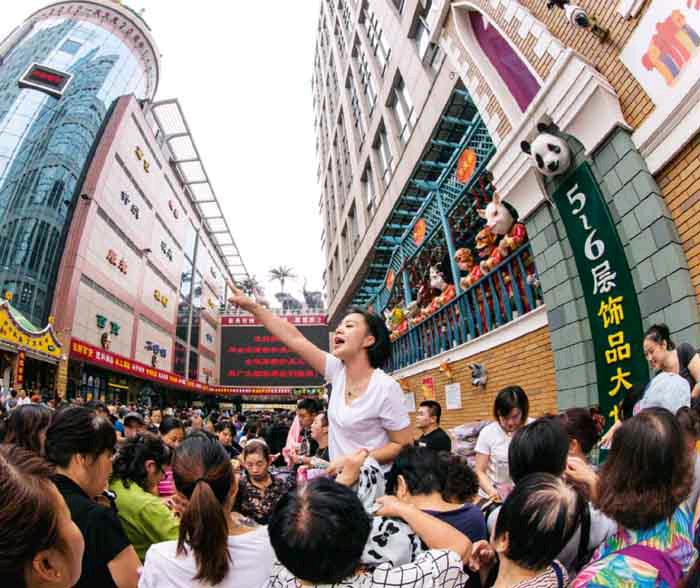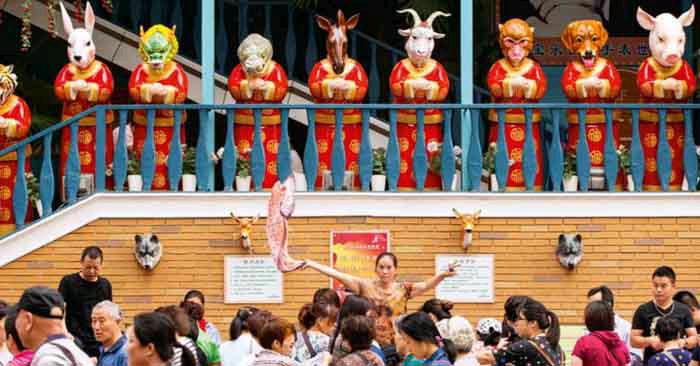Farewell to Tianyi
2017-10-24byHuZhoumeng
by+Hu+Zhoumeng
Although the holiday shopping season is still more than a month away, a Black Friday-esque shopping craze already swept the Tianyi Small Commodities Market, the largest of its kind in Beijing. Located near the West Second Ring Road in Chinas capital, Tianyi is considered by many locals to offer “everything you need.”
Unfortunately, this was the final closing sale. Clearance sale signs were found everywhere in the market, and customers carrying bags and even suitcases picked the shelves bare. Their shopping enthusiasm couldnt be cooled by the chilly air conditioners. Over the cries of peddlers and the noisy haggling, loudspeakers repeatedly announced that the Tianyi market would officially close on September 16, 2017.
To solve problems such as population pressure, air pollution, traffic congestion and surging housing prices, Beijing launched a campaign aiming to remove its “non-capital functions” in 2015. Given that wholesale markets like Tianyi attract a heavy concentration of traffic, people and cargo, they become key targets for removal or renovation. As of now, over 370 wholesale markets have been relocated out of Beijing. As early as the end of 2015, Tianyi closed its branch store in Dianmen. In early July this year, dealers at the Tianyi Small Commodities Market received a notice that the 25-year-old market would be closed soon.
Last Day
At 7:30 a.m. on September 15, 2017, 28-year-old security guard Ping Yu opened the gate of the Tianyi market as usual. Customers already waiting outside swarmed in immediately. According to Ping, customer traffic had increased substantially in recent days, peaking at 10 a.m. when drivers had to wait for as long as two hours to park in the markets underground parking lot.
Four years ago, Ping moved to Beijing from his hometown in Shanxi Province. He joined the security guard team in the citys Xicheng District, and had worked at the Tianyi market ever since. His duties also included giving customers directions and helping them find lost companions. In the last few days before the market closed, many long-time customers asked to take a picture with him. “The market will be gone forever, so many want to keep it in their memories with photos,” Ping explained.
The largest small commodities wholesale and retail market in Beijing, Tianyi consisted of three buildings with business space totaling 41,400 square meters, equal to nearly six soccer fields. The market concentrated some 1,900 dealers that offered more than 130,000 kinds of commodities, ranging from clothes, gifts and stationery to household appliances and cosmetics.endprint
Li Ying, 65, squeezed through the crowd to get to her husband, Xie Kai, who carried a selfie stick. She showed him a brown haversack she had just bought for 25 yuan (US$3.8). Li was a frequent customer of Tianyi, and the amber necklace, bracelet and earrings she wore had also been bought there.
“I often spend the whole morning shopping here,” Li grinned. “At lunchtime, Id eat a plate of dumplings at a nearby restaurant. What a great life!” After the closure of the market, shed particularly miss the cartoon and animal sculptures in the square. Despite decades of weathering, the iconic decorations never faded.
A group of customers sat resting behind the person-sized sculptures of the 12 zodiac animals. Adjacent to the sculptures was a stall selling silk scarves, with the merchant shouting from atop a stool, “Five yuan each! All of them!”
The shopping craze lasted until the market closed at 6:30 p.m. At that moment, many crowded at the entrance and pointed their cell phones at the hanging electronic clock to capture the moment. The song“Unforgettable Night,” the farewell song of every years Spring Festival Gala, reverberated through the air.
Some residents who live near the market used to complain about the noise and traffic jams caused by disorderly warehouses and restaurants, tricycle carts transporting commodities and wholesale dealers carrying cargo. However, all of these problems vanished when the market closed. The downside is they may find it less convenient to buy gifts or decorations for Spring Festival. According to the planning of Xicheng Districts Commission of Commerce, a handful of hi-tech and financial companies will rent space where the Tianyi market once was.
Relocation
Early on the morning of July 13, 2017, a crane crept up to the market, and several workers removed the “Tianyi Market” sign from atop its main building. The best days of the faded signboard were long gone, as are those of wholesale markets at large. Back in the late 1980s and early 1990s, small commodities wholesale markets like Tianyi mushroomed around China. In recent years, the popularity of online shopping and surging urban real estate prices have caused many wholesale markets to suffer a steep drop in profitability.
Against the backdrop of the integrated development of the Beijing-Tianjin-Hebei region, most of Beijings wholesale markets have planned to move to Hebei Province or Tianjin. It was reported that the Tianyi market will be relocated to Shijiazhuang or Langfang. The administrator of the market also organized survey trips for its dealers to find new places to settle. So far, however, the new location of Tianyi remains uncertain.endprint

Mr. Lin from Zhejiang Province operated a jewelry store in the Tianyi market. For the past 12 years, his necklaces, bracelets and earrings were sold to countries like Croatia, Japan and Russia. He planned to stay in Beijing after the closure of Tianyi.“Perhaps Ill open a new store in the Bairong wholesale market,” he said. “My WeChat store is still in operation. And my network of business partners is here. Even if I get out of the jewelry business, Ill find something else to do.”
Mr. Luo from Sichuan Province was one of Tianyis 70-plus janitorial staff. “I dont know where to go,” he sighed, lacking a clear plan for his future. “Perhaps Ill go where the market moves or return to my hometown.”
On the afternoon of September 15, He Baoqiang, who used to operate a sporting goods shop at Tianyi, came back to “take a last look” at the market with his son, who studies at a local primary school. He was in his 20s when he married and left Hebei Province for Beijing to start a business at Tianyi. His eyes glistened when he remembered fire drills and anniversary celebrations the market organized. “The Tianyi market was always well managed, and it felt like at home.”
At a logistics station in the northeast of the market, 30-year-old courier Cui Meng had almost run out of supplies. He used to work at a steel factory in his hometown in Shandong Province. After the decline of the steel industry, he moved to Beijing to seek job opportunities. During the two years he worked at Tianyi, his delivery business ran well. “At our peak, I delivered more than 1,000 packages a day, which took fix or six trips in a van.”
“This is the last delivery service to Tianyi,” declared one of Cuis colleagues, who sighed and took a selfie in front of an electric tricycle cart loaded with goods before leaving. Cui wistfully watched him riding the cart through a stream of people and vehicles. No more packages would ever be delivered to “Tianyi Market, 29 Fuchengmenwai Street, Beijing.”endprint